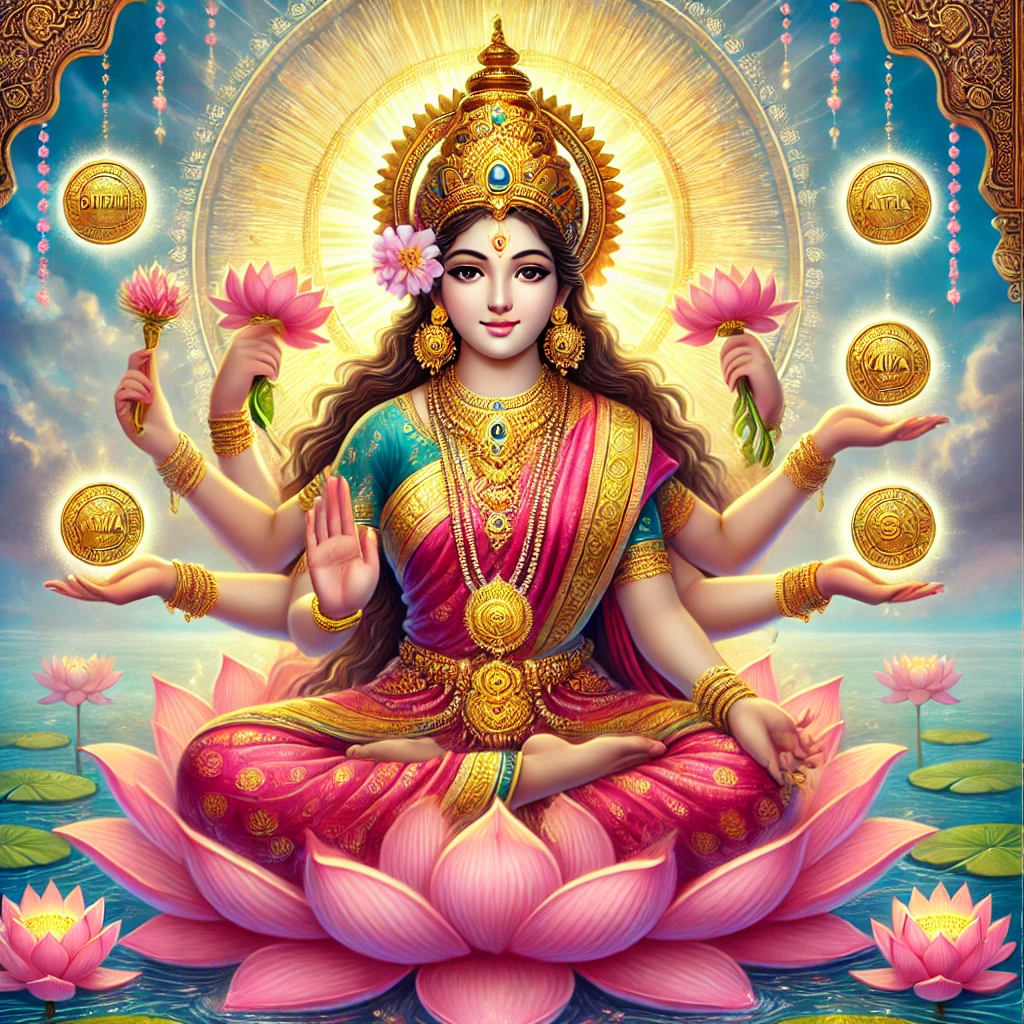Lakshmi is revered as the embodiment of wealth, prosperity, and abundance. As one of the principal deities in the Hindu pantheon, she is not only the goddess of material and spiritual wealth but also of beauty, grace, and generosity. She is the consort of Lord Vishnu, the protector of the universe, symbolizing a balanced partnership in maintaining harmony and prosperity. This article explores the various aspects of Goddess Lakshmi, her symbolism, significance, and the enduring appeal that draws millions to seek her blessings for a prosperous and fulfilling life.
Who Is Goddess Lakshmi?
Goddess Lakshmi, also known simply as Lakshmi, holds a unique place in Hinduism. She is one of the most adored deities, revered for her role in bestowing wealth and fortune upon her devotees. But Lakshmi’s significance extends beyond material wealth; she is also a goddess of inner wealth—bestowing wisdom, peace, and spiritual prosperity.
Lakshmi is often depicted seated on a lotus, a symbol of purity and self-reliance, with gold coins flowing from her hands, symbolizing unending prosperity. Her four hands represent the four goals of life: Dharma (righteousness), Artha (wealth), Kama (desires), and Moksha (liberation).
Origins and Stories of Lakshmi
Birth of Lakshmi from the Ocean of Milk
Lakshmi’s origin story is one of Hindu mythology’s most famous and inspiring tales. Known as the Samudra Manthan or the churning of the ocean, this story begins with a cosmic collaboration between the gods (Devas) and demons (Asuras) to obtain amrita, the nectar of immortality. During this churning, an array of divine treasures emerged from the ocean, one of which was Goddess Lakshmi, radiant and resplendent. She emerged from the depths, representing the essence of prosperity, purity, and fortune. Lakshmi chose Lord Vishnu as her divine consort, symbolizing her dedication to sustaining life and universal balance.
This story signifies that true prosperity and wealth come when the forces of good and evil are in balance, underscoring that material wealth should be accompanied by ethical principles and spiritual values.
Lakshmi as a Supportive Force in Lord Vishnu’s Avatars
Lakshmi is inseparably linked to Lord Vishnu, and her form and attributes adapt to each of Vishnu’s avatars. For example, in the Ramayana, she incarnates as Sita, the loyal and virtuous consort of Lord Rama. In the Mahabharata, she manifests as Rukmini and also as Radha, who plays a central role in Lord Krishna’s life. These manifestations show that Lakshmi is not only a goddess of wealth but also a symbol of devotion, love, and unwavering loyalty.
Symbolism of Lakshmi – The Goddess of Wealth and Prosperity
Lakshmi’s image is a powerful symbol with deep spiritual and philosophical meanings:
- Seated on a Lotus: The lotus represents purity and self-sufficiency. Just as a lotus rises from muddy waters yet remains unblemished, Lakshmi inspires her devotees to pursue a path of righteousness and purity amid worldly distractions.
- Gold Coins Flowing from Her Hands: The cascading coins symbolize endless prosperity and generosity. Lakshmi’s wealth is not meant to be hoarded; it flows freely, symbolizing that wealth, when shared with humility, multiplies and brings joy.
- Four Hands Representing the Four Pursuits of Life: Each of her hands signifies one of the four purusharthas, or goals of human life—Dharma (duty), Artha (wealth), Kama (desires), and Moksha (liberation). Lakshmi reminds devotees that material wealth should be used responsibly and aligned with a life of balance, ethics, and spiritual goals.
Importance of Lakshmi Worship in Hindu Culture
Diwali – The Festival of Lights and Lakshmi’s Special Day
One of the most prominent occasions for worshipping Lakshmi is during the Hindu festival of Diwali. Known as the Festival of Lights, Diwali is celebrated with grandeur and devotion, particularly in northern India, where Lakshmi is invited into homes with lamps, sweets, and flowers. On this day, devotees clean and decorate their homes as a gesture to welcome Lakshmi, symbolizing their desire for her blessings in their lives for the coming year.
Fridays and Lakshmi Pooja
Many Hindu households observe Fridays as auspicious for Lakshmi worship. On these days, devotees perform Lakshmi Pooja (prayers) and offer flowers, fruits, and sweets, seeking her blessings for material and spiritual wealth.
In South Indian traditions, Varalakshmi Vratam is a unique festival dedicated to the goddess, where women observe fasts, perform special rituals, and adorn their homes in her honor. This vratam, or vow, is believed to bring prosperity, health, and happiness to families.
How to Invite Lakshmi’s Blessings: Practices and Rituals
1. Keeping the Home Clean and Welcoming
Cleanliness is paramount in Lakshmi worship, as it is believed that the goddess only enters homes that are well-kept and inviting. Maintaining a clean, serene environment invites not only Lakshmi but also a sense of inner peace and mental clarity.
2. Charity and Generosity
Lakshmi embodies generosity, and one way to invite her blessings is to be generous. Offering food, clothing, and aid to those in need, especially on Fridays, is a practice that attracts her blessings, symbolizing the flow of wealth.
3. Use of Sacred Symbols
Hindus often draw sacred symbols like the Swastika and Om at the entrances to their homes. These symbols are believed to attract Lakshmi and create an aura of auspiciousness.
4. Worship with Sincere Devotion
For those seeking Lakshmi’s blessings, devotion and gratitude are key. Whether it’s through daily prayers, meditation, or chanting Lakshmi’s mantras like “Om Shreem Mahalakshmiyei Namaha,” offering heartfelt devotion is essential.
Lakshmi Beyond Material Wealth – The Inner Wealth of the Soul
While many worship Lakshmi with the hope of financial prosperity, the goddess’s blessings are not limited to material gains. True prosperity, according to Hindu beliefs, includes inner wealth: compassion, kindness, wisdom, and peace. The pursuit of material wealth without these qualities can lead to dissatisfaction, whereas a balanced life brings lasting happiness.
Lakshmi reminds us that wealth without virtue is temporary, and those who use their wealth for good are truly blessed. Her teachings encourage people to look inward, recognizing that real wealth is found in values that uplift the soul.
Everlasting Relevance of Lakshmi’s Teachings
In today’s fast-paced, material-driven world, the teachings of Lakshmi are more relevant than ever. By embracing her values, we learn that wealth should not be an end in itself but a means to a fulfilling and balanced life. Her symbolism invites us to adopt a generous spirit and a life of ethics, making her not just a goddess of wealth but a guide to achieving holistic prosperity.
Finding a Personal Connection with Lakshmi
For those interested in deepening their spiritual connection, items such as Lakshmi statues, lotus incense, and Lakshmi yantras can serve as focal points for meditation and devotion. At spiritualguru.lk, you’ll find an array of spiritual accessories to enhance your devotional practice, including items crafted specifically for worshipping Lakshmi.
Conclusion
Goddess Lakshmi’s timeless appeal lies in her embodiment of values that resonate universally: prosperity, wisdom, and kindness. Her stories and symbols inspire millions to strive for success and peace, reminding us that true wealth lies in a life lived with purpose, generosity, and balance.
Lakshmi’s presence in the heart of Hinduism exemplifies the ideal of holistic wealth—encouraging us to cultivate both outer and inner prosperity. As we embrace her teachings, we invite not only financial abundance but also peace, joy, and spiritual fulfillment into our lives. Whether you are seeking material wealth or personal growth, the blessings of Lakshmi offer a path to a balanced, prosperous, and deeply meaningful life.







Pingback: What is Lakshmi Pooja? - Spiritual Guru
Pingback: Who is Anumati? The Goddess of Good Fortune - Dharma Pulse
Pingback: Kubera: The God of Wealth and Prosperity - Dharma Pulse
Pingback: Lotus Seeds and Goddess Lakshmi What is the Connection? - Spiritual Guru
Pingback: Who Can Wear a Lotus Seed Mala? - Spiritual Guru
Pingback: Lotus Seed Mala Material Benefits of This Bead - Spiritual Guru